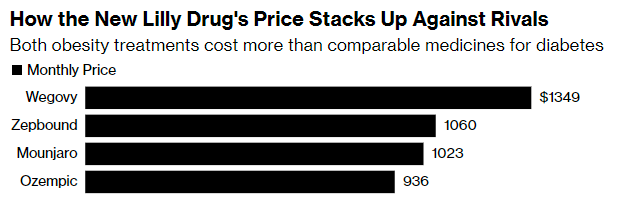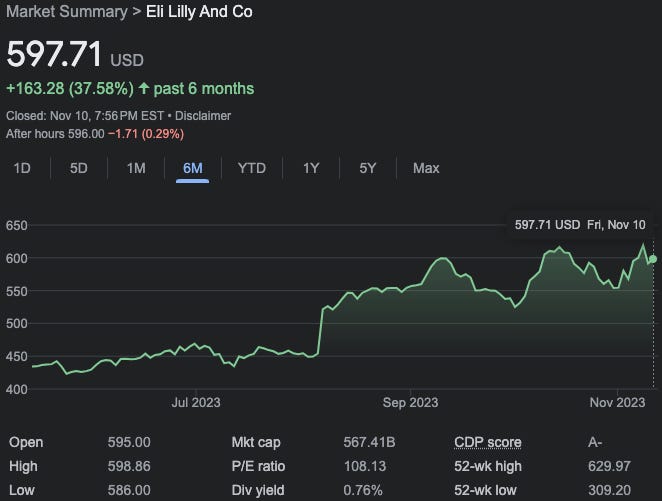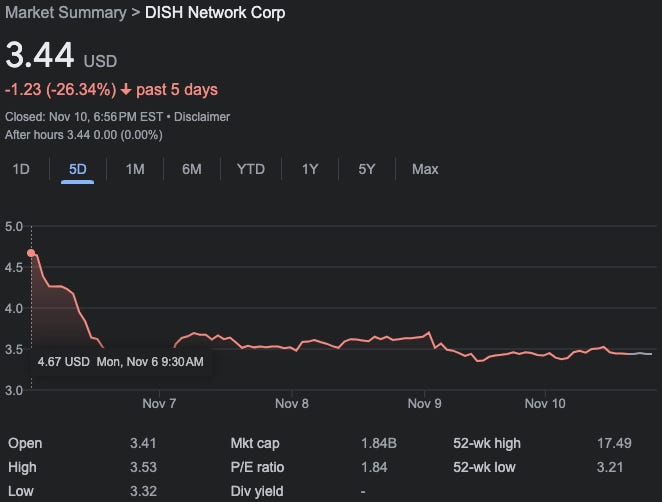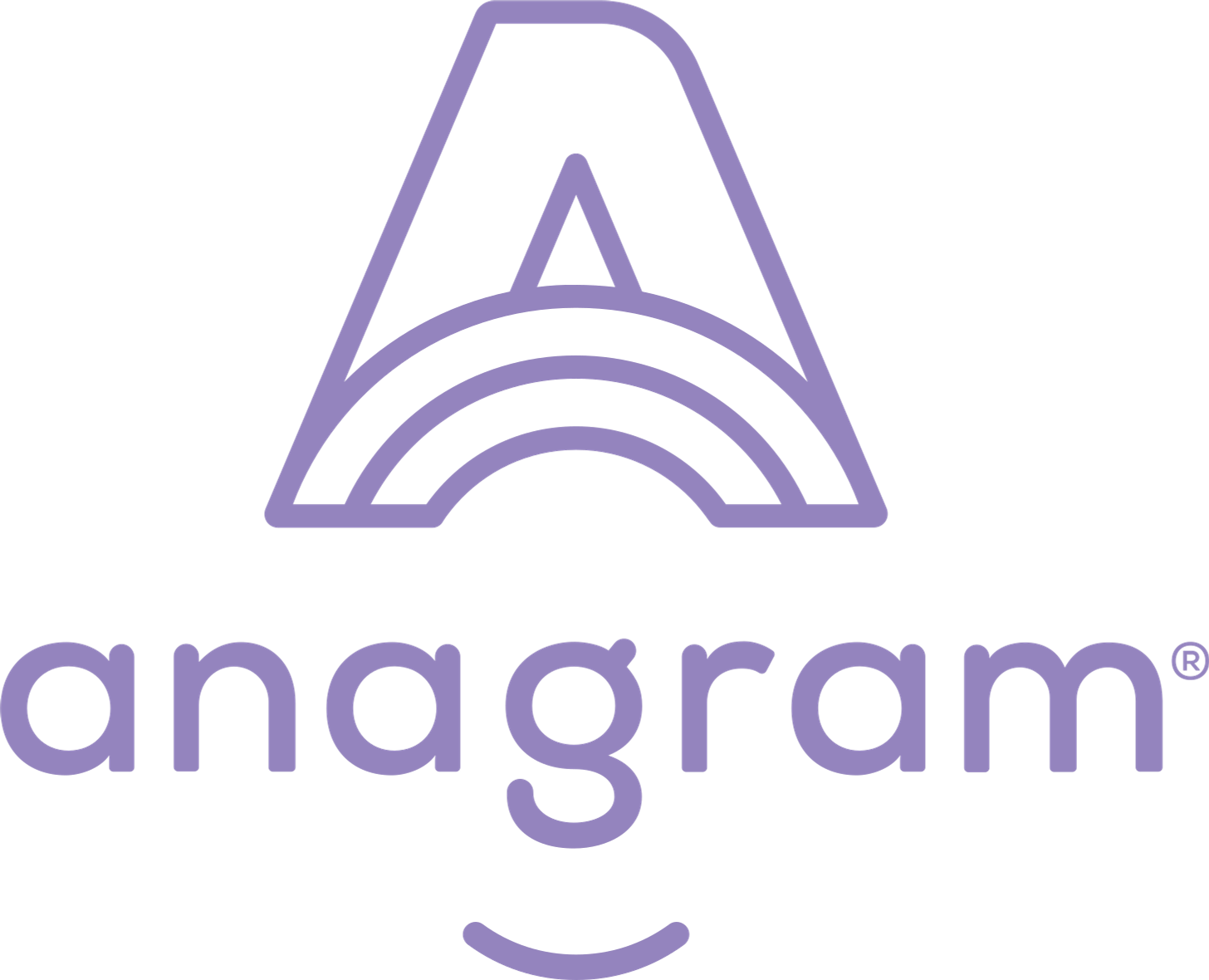👍 Winners of the Week+ 👍
1. AMC Entertainment Inc. ($AMC). The movie theater company that everyone seems excited to see fail reported earnings this week and … well … there’s no failure in sight. It had strong results mainly due to the success of the Taylor Swift movie.
CEO Adam Aron stated on the earnings call:
We’re all smiling. They’re smiling. We’re smiling. Our market share is abnormally high of the tickets sold. And I think that, in part, is because we’ve been so committed to the project. It’s pretty hard to pick up a newspaper anywhere in the world or go on the internet and look at news and not see the AMC name connected to Taylor Swift.
EPS came in at $0.08, well above analysts expectations of negative $0.19. Mr. Aron expects continued growth from the Taylor Swift movie and the forthcoming Beyonce movie. In addition, they have been shrinking their debt load. AMC purchased $24.2mm of its 10% ‘26 cash/12% PIK notes at a discount of roughly 28%. The outstanding $1.1b PIK Notes debt was up close to 4 points this week, at ~81, and 7.5% first-lien notes due ‘29 were up close to 3 points, at ~73. Some of this rise is attributable to AMC’s planned $350mm ATM equity program, the proceeds of which will be used for, among other things, debt pay down. Notably, the company completed a $325.5mm ATM as recently as September. Debtholders are licking their chops while shareholders are licking their wounds. The stock is down 80% over the last six months. 😬
In related news, the Hollywood actors strike is over, marking the end of the longest actor walkout in history. Large gripes among the actors revolved around potential disruption from AI, compensation from streaming services, and healthcare. Now that the parties have resolution, the likes of Mr. Aron can breath a sigh of relief as straight-to-theater fare from the likes of Tay Tay and Beyonce is more the exception than the rule. AMC will need inventory and now it’s much closer to getting it than it was a mere week ago (though a number of movies have already been pushed out meaningfully, in some cases into ‘25).
2. Eli Lilly And Co. ($LLY). In exciting weight loss GLP-1-related news, Eli Lilly’s drug, Zepbound, just got the final nod from the US Food and Drug Administration (“FDA”). Zepbound is Eli Lilly’s brand name for tirzepatide, which, under the Mounjaro brand, has been used as treatment for type 2 diabetes. You might’ve heard of that name already amidst the GLP-1 fervor because, in some cases, doctors prescribed it off-label for weight loss use. FDA approval just gives the official stamp for tirzepatide for the indication of weight loss. Tirzepatide is similar to Novo Nordisk’s ($NVO) Wegovy (weight loss) and Ozempic (diabetes) that use semaglutide. They’re both GLP-1 receptor agonists, which is a fancy way of saying that they help manage blood sugar levels. Just doing a quick Google search and you get a list of GLP-1 drugs for the treatment of diabetes that include dulaglutide (Eli Lilly under the brand name Trulicity), exenatide (discontinued), liraglutide (Novo Nordisk under the brand name Victoza and Saxenda), lixisenatide (discontinued), semaglutide, and tirzepatide. Zepbound is set to be priced cheaper than Wegovy, but it’s still going to cost a hefty $1,060/month.
The GLP-1 space is fast evolving, and there are already trials being done on pill versions of these obesity drugs from both Eli Lilly, Novo Nordisk, and Pfizer Inc ($PFE). The market is all for it. Shares of LLY are up nearly 38% in the past six months:
In contrast, shares of companies that could be affected by mass adoption of GLP-1s have been getting hammered. See, for example, Coca-Cola Co. ($KO), which is ⬇️ 11.5% over the past six months or Krispy Kreme Inc. ($DNUT), which is ⬇️ 15% in the same time frame (against an S&P 500 Index that is up 7%).
👎 Losers of the Week+ 👎
1. S&P 493. We know we touted the S&P 500 Index’s last-six-months performance above, but there’s more there than meets the eye — and it is relevant to a set of professionals who tend to get busier when an economy isn’t super duper healthy. Alphabet Inc. ($GOOGL, up 12.8% last six months), Amazon Inc. ($AMZN, up 30% LSM), Meta Platforms Inc. ($META, up 40% LSM), Microsoft Corp. ($MSFT, up 19.6% LSM), Nvidia Corp. ($NVDA, up 70.5% LSM), and Tesla Inc. ($TSLA, up 27.7% LSM) are household tech names that have been the major drivers of growth in the market this year. The fortunes of these companies are the rising tide that has lifted the boats of the benchmark S&P 500 Index. YTD these “magnificent seven’s” share prices have risen collectively by about 52% while the stalwart and 493 older names in the index have fallen by ~2%. The P/E ratio for the top seven names are about double the rest of the index, which could indicate these predominately tech companies have to fall to earth at some point. That being said we can likely infer better clues about the overall state of the US and global economy when we separate these very few top players and zoom in on performance of the rest. The picture is not nearly as rosy.
2. Real Estate Brokers. Ok, fine, this was last week: hence why we’re being cute with the “Week+.” Anyway, last week kinda sucked for The National Association of Realtors and several large real estate brokerages after a federal jury in Kansas City rendered a verdict finding that they conspired to keep commissions for home sales artificially inflated. The damages amount? $1.8b! The practice in question required, as a prerequisite to listing a house, a seller agent to specify a commission for a buying agent (paid by the seller agent) which, curiously, just happened to almost always be 6% for the entire transaction (ultimately split between the seller and buying agent). This practice has allowed agents to boost commissions as home prices and mortgage rates have risen.
The verdict could be the first domino that dramatically changes the fee structure in the real estate brokerage industry. Other plaintiffs nationwide are waiting in line for trial, including a group in Illinois seeking as much as $40b. In a period where real estate is already stale, this ruling could prove costly. A report from Ryan Tomasello at Keefe, Bruyette & Woods estimates that lawsuits could lead to a 30% reduction in the $100b real estate commissions yearly and push over 50% of agents out of the industry. If that happens, there’d only be 320mm agents left in America!! 😜
Brokerages Zillow Group Inc. ($Z), Redfin Corp. ($RDFN), Opendoor Technologies Inc. ($OPEN), eXp World Holdings Inc. ($EXPI), and Compass Inc. ($COMP) all saw shares drop on the news. The stock performance for these companies over the past month is ugly AF. Some, like Ben Thompson, for instance, seem to think this may be overplayed. Zillow, he says, could end up benefiting to the detriment of realtors.
3. Educational Services. Q3’23 earnings are in for many companies within the sector, and we are beginning to see the impact of the AI revolution.
Chegg Inc. ($CHGG), a company providing homework help (read: answers) and textbook rentals to students, reported this week and saw a 4% decrease YoY in subscription service revenues. Students are beginning to switch from Chegg to OpenAI’s ChatGPT for homework help. The decrease in total active users seen over the past year would be even more telling. Many Chegg customers likely have already made the switch to ChatGPT, though unknowingly, they are still paying using their parent's credit card.
CFO Andy Brown (who is now stepping down) said in their earnings call:
We expect the development of AI will allow Chegg to embrace a much larger opportunity over time. We believe there is nobody better equipped to meet the current or future needs of students than Chegg.
We’re not buying it. ChatGPT has gotten to the point where it is just too big and powerful for Chegg to compete with (it’s also free … sort of). Chegg is looking to roll out products that include AI features in ‘24, but that very well may be too little too late.
Investors reacted poorly to the earnings call as well, with the stock dropping 9% over the week (though it has since rebounded to just under where it was upon the report).
4. Sphere Entertainment Co. ($SPHR). Surely by now you’ve heard of “The Sphere,” the practically brand new arena on the Las Vegas Strip. The thing looks so cool that it’s even managed to rehabilitate the reputation of U2, a band probably more famous in recent years for violating your iphone than it is for any of its actual music (don’t @ us, boomers: we challenge you to name one song they’ve released in the last decade that actually moved the needle). For all its rejuvenative powers and coolness, it turns out that the Sphere is ⚡️achtung baby⚡️currently a cash incinerating machine. Per
citing Billboard:The results are in, and the Sphere — the gigantic, spherical landmark in Las Vegas that has enraptured the nation’s attention — is losing vast amounts of money very quickly. Built for $2.3 billion, the 366-foot-tall monument to hubris covered in 580,000 LED lights has posted an operating loss of $83.1 million this past quarter, making $4.1 million from U2’s concerts, $2.6 million from advertising and more, and then spending $84.2 million on administrative expenses on top of $7.1 million in other expenses. That being said, this is Vegas we’re talking about, and as they say, the gigantic and disconcerting sphere always wins.
He’s being sarcastic, clearly, but he’s not wrong. While we have the company listed as a loser due to this financial performance, investors in the company’s stock are anything but. The stock is up 77.8% YTD and rebounded upward despite this earnings report, finishing the week up 4%. 🤷♀️
5. Dish Network Corp. ($DISH). The company’s Q3’23 earnings absolutely 💩 the bed on news of a STEEEEEEEEEEEEEP drop in pay-TV (~64k) and wireless subs (-225k). Performance was so terrible that the CEO is running for the hills as if his pants are on fire; he announced that he’s resigning with a departure date within days. No big transition period or anything. 🏃🔥. Revenue dropped 9.5% to $3.7b and the company swung from net income of $412mm to a net loss of $139mm. The entire capital structure got utterly bullocksed: the company’s 5.125% senior notes dumped from the low 50s into the mid-40s; its 5.875% ‘24 senior notes dropping into the mid-80s from the low 90s; and its stock … well … doing this:
The company announced that it intends to sell certain spectrum assets (and a 120k prepaid mobile subs) located in Puerto Rico and the US Virgin Islands to Liberty Latin America for $256mm.
This slow-moving train wreck is in motion.
🎈New Chapter 11 Bankruptcy Filing - Anagram Holdings LLC🎈
On November 8, 2023, balloon manufacturer Anagram Holdings LLC, Anagram International Inc., and Anagram International Holdings Inc. (“Anagram,” or collectively, the “debtors”) filed chapter 11 bankruptcy cases in the resurgent (lol) Southern District of Texas (No-Longer-Retired Judge Isgur).* Anagram Holdings LLC is — wait for it — 100%-owned by Party City Holdings Inc. (“Party City”), which recently had its own joyful experience with the bankruptcy bar.** It’s a bankruptcy party!! Anyone know where we can get the balloons?!?






